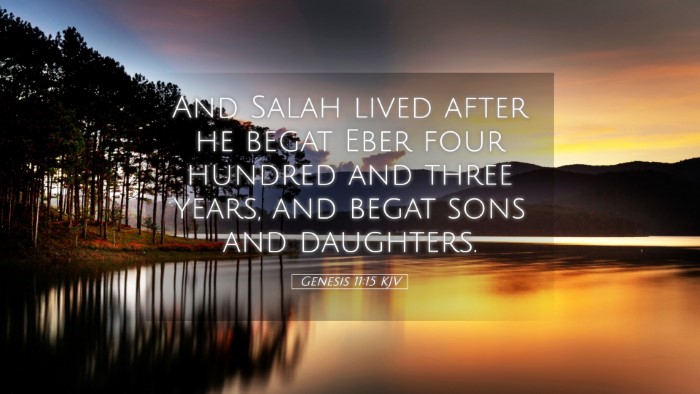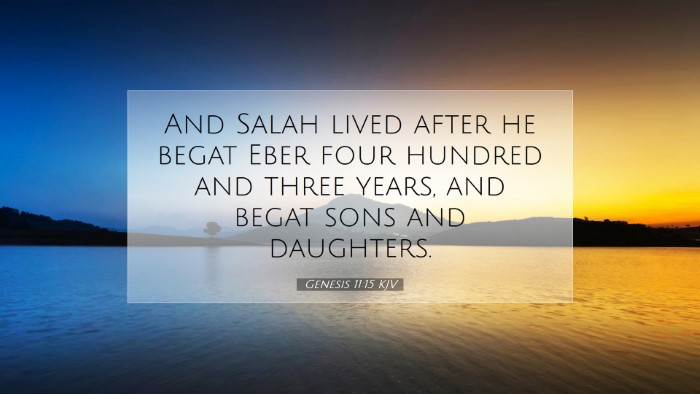Commentary on Genesis 11:15
Genesis 11:15 reads: "And if she bear children, then thou shalt say unto her, Thou art my sister, and thou wast the daughter of my father, but not the daughter of my mother; and thou shalt be my wife." This verse occurs in the context of the story of Terah and his family, highlighting the complexities of familial relationships and the moral dilemmas faced by individuals in ancient times. Below is a comprehensive commentary that combines insights from several public domain resources.
Context and Importance
The passage is part of the broader narrative concerning the Tower of Babel and the lineage from which Abraham will arise. Understanding this context is essential as it illustrates God’s providence and the unfolding of His plan through a particular family line.
Historical Background
Matthew Henry notes that this verse involves significant historical context regarding Terah, Abraham, and the surrounding nations. The cultural norms of the time placed a considerable emphasis on familial ties, and thus the complexity of claiming kinship is essential to understanding the ethical considerations of the time.
Textual Analysis
Adam Clarke elaborates on the nuances of the language employed in this passage. The use of the terms "sister" and "daughter of my father" suggests a close kinship, wherein the identity is intertwined with both familial and marital connections. This duality reflects the societal norms wherein marriages within close kin provided both social stability and economic advantage.
Moral and Ethical Considerations
Albert Barnes highlights the moral implications of describing a wife as a sister, a practice that might appear deceptive. He draws attention to the ethical dilemmas that arise from such arrangements and how they may reflect the limited understanding of marriage and familial bonds in Terah’s time. The moral question is raised about the integrity of relationships and the lengths to which individuals might go to protect their family or secure their position.
Theological Reflections
From a theological standpoint, Henry emphasizes that this verse can be interpreted as a foil to God's covenant with Abraham. While human relationships are complex and often fraught with ambiguity, God's intentions are clear and unwavering. This dichotomy serves to highlight the faithful guidance of God amidst human failings.
Lessons for Contemporary Faith Communities
This passage invites modern readers to reflect on the nature of relationships within a faith community. The complexities present in Genesis 11:15 can serve as a reminder for pastors and theologians to encourage transparency and integrity in relationships among congregants.
Significance of Family
Families continue to be foundational within the church, and exploring how familial ties are portrayed in Scripture is essential for developing healthy church dynamics. The interplay between kinship and marital relationships offers insight into how contemporary Christian families might navigate similar dynamics today.
Importance of Honesty
Barnes points out that the deceptive nature of Abraham's claim emphasizes the necessity for honesty in relationships. For pastors and leaders, this serves as a focus to preach on the values of truthfulness and integrity, pointing to Christ as the ultimate example of truth.
Divine Providence
Additionally, Clarke reminds us that despite human imperfections, God’s plan prevails. The assurance of divine providence provides comfort, encouraging believers to trust that God can work through brokenness and complexity to achieve His purposes. It fosters a view of history wherein God's sovereignty is constantly at work, shaping events toward redemptive ends.
Conclusion
The insights gathered from these public domain commentaries illustrate that Genesis 11:15 is laden with meaning that extends beyond its immediate context. It stands as a rich source for understanding the complexities of familial relationships, revealing moral dilemmas, and affirming God's overarching plans. As pastors and theologians engage with this text, they are called to reflect upon its implications for contemporary understanding of family, integrity, and divine guidance.
The study of scripture requires both meticulous attention to detail and an understanding of the overarching narratives that shape the life of faith. Genesis 11:15 reflects this complexity beautifully, blending the ancient with contemporary relevance.


